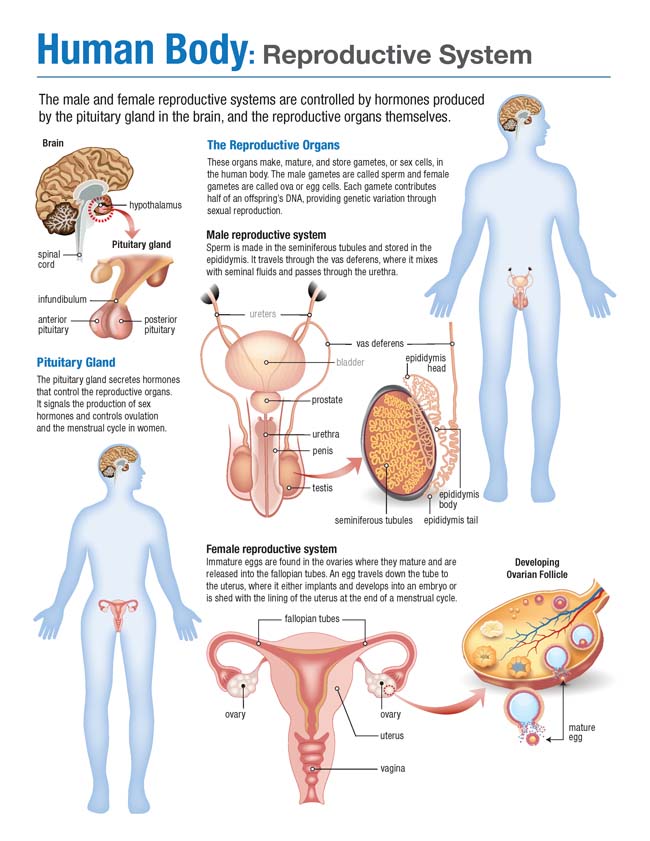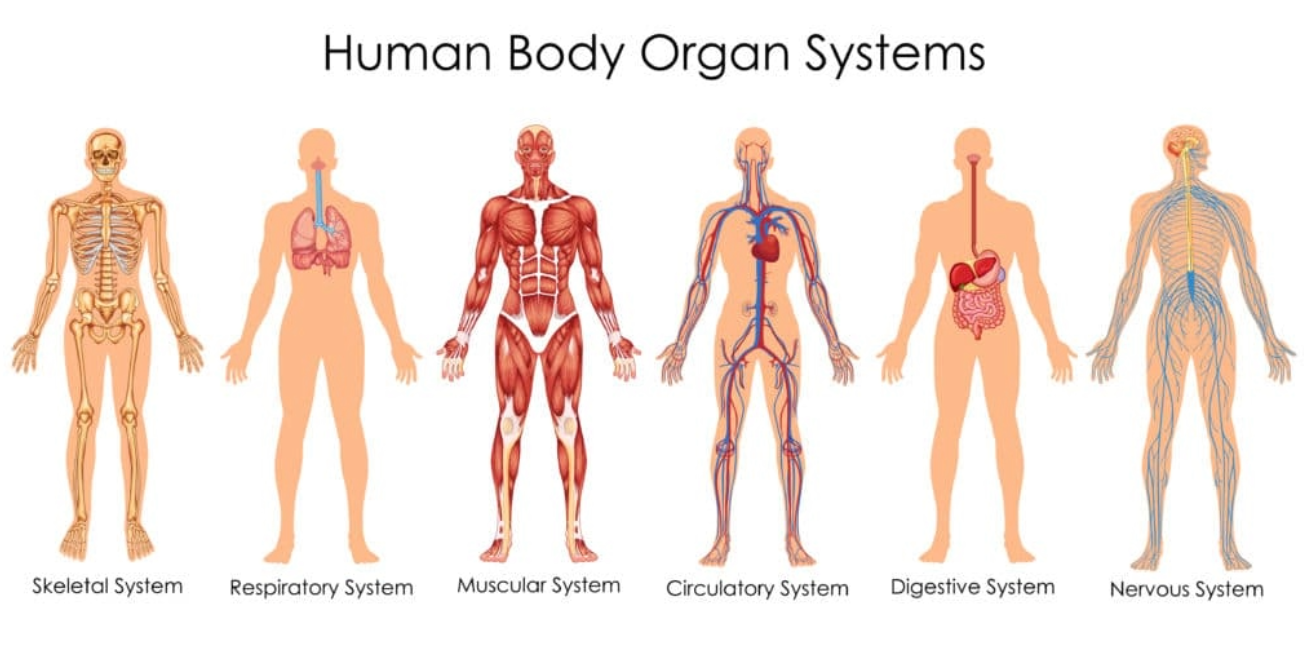Reproductive System: The Cradle of Life
The reproductive system, a marvel of nature, encompasses an intricate network of organs and tissues dedicated to the continuation of life. In females, this system includes vital components such as ovaries, fallopian tubes, uterus, cervix, and vagina, while in males, it involves the prostate, testes, and penis. Its primary function is twofold: the generation of sex cells and the secretion of hormones that orchestrate reproduction and influence essential biological processes.
Within males, the testes stand as champions, producing the vital ingredient for life - sperm. On the other hand, females harbor the precious ova within their ovaries, offering the promise of new beginnings. This reproductive saga is guided by a symphony of hormones orchestrated by the endocrine system, influencing pivotal milestones like puberty, menstruation, libido, and pregnancy. Notably, the intricate interplay of nerves, muscles, and blood flow choreographs the performance of these essential reproductive organs.
Purposefully designed, the reproductive system is not solely about propagation. It also yields its influence over secondary sexual characteristics, imprinting uniqueness upon each individual. Its orchestration of hormones affects voice pitch, body hair, breast development, and other traits that contribute to the diverse tapestry of the human form. However, this wondrous system is not without its vulnerabilities. The specter of reproductive cancers looms, affecting both men and women. Infertility, a silent struggle for many, can challenge the dreams of parenthood. Additionally, hormonal imbalances can cast a disruptive shadow over the delicate dance of reproduction.
The reproductive system intricately interacts with the endocrine system, where hormones orchestrate pivotal processes like puberty, menstruation, libido, and pregnancy. Additionally, the coordinated efforts of nerves, muscles, and circulatory networks are vital in facilitating the optimal function of reproductive tissues and organs. This symphony of physiological elements ensures the seamless operation of the system, contributing to overall reproductive health and well-being.
In the realm of well-being, LifeWell Coach offers invaluable guidance. Our approach integrates the intricate connection between mind, body, and soul. Through personalized strategies and holistic wellness practices, we empower you to navigate the intricate pathways of the reproductive system. Together, we aim not only to safeguard the cradle of life but also to enhance its vitality and overall well-being. Join us on this transformative journey towards reproductive harmony, and let the miracle of life unfold.

LifeWell Coach Tips to Support the Reproductive System
- Practice safe sex to protect against sexually transmitted diseases (STDs) and unplanned pregnancy and schedule regular screenings. These can include Pap smears, pelvic exams, STD testing, and cancer scans for reproductive health concerns, like breast, cervical, prostate, and testicular cancers.
- Support reproductive health and fertility with an eating pattern high in folate, iron, and monounsaturated and polyunsaturated oils and low in saturated fat and sugar.
- Maintain a Healthy Weight: Both underweight and overweight individuals may face challenges with reproductive health. Achieving and maintaining a healthy weight through balanced nutrition and regular exercise can positively impact fertility.
- Manage Stress: Chronic stress can disrupt hormone balance and reproductive function. Engage in stress-reducing activities like meditation, yoga, or deep breathing exercises to promote overall well-being.
- Stay Hydrated: Proper hydration is essential for overall health, including reproductive health. It helps maintain bodily functions and supports circulation, which is crucial for reproductive organs.
- Limit Alcohol and Caffeine: Excessive alcohol and caffeine consumption can potentially interfere with hormone levels and reproductive function. Moderation is key.
- Avoid Smoking and Illicit Drugs: These substances can harm reproductive organs and have detrimental effects on fertility. Quitting smoking and avoiding illicit drugs is crucial for reproductive health.
- Get Regular Exercise: Physical activity supports overall health, including reproductive function. Engaging in regular exercise can help regulate hormone levels and promote optimal circulation.
- Practice Kegel Exercises: For both men and women, Kegel exercises can help strengthen pelvic floor muscles, which play a crucial role in sexual health and reproductive function.
- Maintain a Healthy Relationship: Open communication, trust, and mutual support in a relationship contribute to a healthy emotional and psychological environment, which can positively impact reproductive health.
Remember, it's important to consult with a healthcare professional for personalized advice and guidance on maintaining reproductive health.
Foods and Supplements to Support Reproductive System Health
Foods (Female):
- Leafy greens, whole grains, lean proteins, nuts, seeds, legumes.
- Fatty Fish: Rich in omega-3 fatty acids, essential for hormone production and overall reproductive health.
- Avocados: Packed with monounsaturated fats and folate, supporting hormonal balance and fertility. Berries: Loaded with antioxidants that promote overall health and may positively impact reproductive function.
- Broccoli: Contains folate, a crucial nutrient for reproductive health and fetal development.
- Flaxseeds: High in lignans, which may help balance hormone levels and support reproductive health.
Foods (Male):
- Oysters, pumpkin seeds, spinach, tomatoes, berries.
- Dark Chocolate: Contains L-arginine, an amino acid that may improve sperm quality and motility.
- Tomatoes: Rich in lycopene, an antioxidant that may enhance sperm health.
- Walnuts: High in omega-3 fatty acids, which may improve sperm quality and motility.
- Pomegranates: Packed with antioxidants, they may promote sperm quality and motility.
- Citrus Fruits: Rich in vitamin C, which may help improve sperm quality.
Supplements
- Folic Acid (for women), L-Arginine (for men), Maca root.
- Zinc: Important for male reproductive health, it supports sperm production and motility.
- Selenium: An essential mineral for male fertility, as it helps protect sperm from damage.
- Coenzyme Q10 (CoQ10): Known for its antioxidant properties, it may benefit overall reproductive health.
- Vitamin E: An antioxidant that may help improve sperm quality and motility.
- L-Carnitine: Amino acid that may support sperm health and motility.
It's essential to consult with a healthcare professional before starting any new supplements, especially if you have underlying health conditions or are taking medications.
Embracing the Essence of Creation: A Journey Within
As you embark on this transformative journey, we invite you to delve deeper into the essence of creation, celebrating the profound connection between the Divine Feminine and the miraculous gift of life. Explore our LifeWell Divine Feminine collection, a reflection of the beauty, strength, and wisdom inherent in every individual. Each piece is crafted with intention, inviting you to embody the power of creation within. This is the dawn of a new era, and the spark of creation resides within us all, waiting to be celebrated and embraced. For an even deeper dive into the mysteries of the Divine Feminine, don't miss our Divine Feminine Triple Goddess article. It's an exploration of the three archetypal aspects that reside within every person, offering a profound understanding of your unique power and potential.









